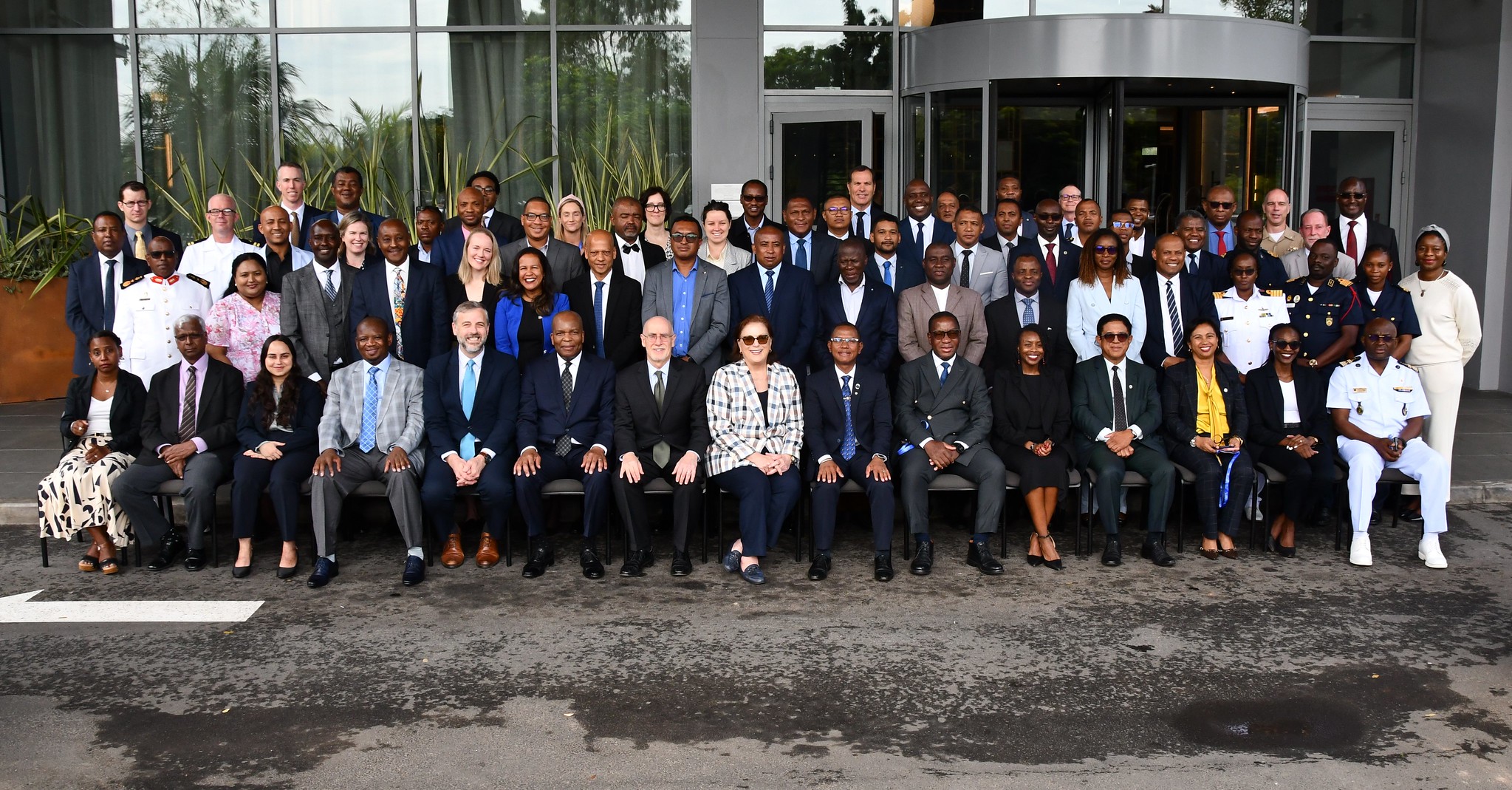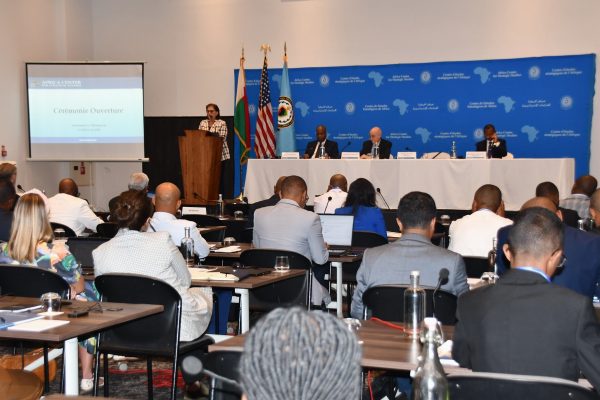The Africa Center for Strategic Studies strives to support American partners in Africa who take the leading roles in addressing some of the continent’s most pressing security challenges, such as terrorism, maritime insecurity, and transnational organized crime (TOC). Through its vibrant networks of alumni as well as its capacity to facilitate dialogues, collaborations, and knowledge-sharing among diverse stakeholders across the continent, the Africa Center brings together key actors—ranging from military and civilian leaders to policy experts and practitioners—to ensure a cohesive, coordinated, and proactive approach in responding to complex threats. Recent engagements in Antananarivo, Madagascar in February and New York, New York in January illustrate the urgency of these issues and highlight the importance of building strong regional and international security networks to tackle them effectively.
One of the major security challenges facing the African continent is maritime crime, which threatens the stability and prosperity of coastal and island nations in the Western Indian Ocean. The significance of this issue was highlighted during a multinational seminar held in Antananarivo, Madagascar, where experts and stakeholders from various countries came together to discuss the growing threat of transnational organized crime at sea. The seminar’s focal point was the need to strengthen regional maritime security efforts and improve cooperation between governments and organizations dedicated to combating illegal, unreported, and unregulated (IUU) fishing, piracy, and other illicit activities in the region.
The participants in Antananarivo, including naval chiefs and civilian maritime authorities, explored practical ways to enhance interoperability between national maritime forces and strengthen the exchange of critical information. A shared approach was discussed in the context of the Djibouti Code of Conduct (DCoC), which provides a framework for maritime security cooperation in the Western Indian Ocean. The focus on interoperability was seen as a critical step toward a more unified regional strategy, where countries could more easily coordinate their responses to maritime threats. This would involve not only sharing intelligence but also aligning national policies, training procedures, and operational protocols to improve response times and efficiency.
As one participant from the seminar emphasized, “The real challenge isn’t just the crime itself, but the fragmentation of efforts. We need to think regionally, to pool resources, share intelligence, and act with one voice to be effective against these maritime threats.”
The discussions underscored the urgency of addressing maritime crime as it directly impacts the economies and security of the region. IUU fishing, for example, deprives countries of vital marine resources and undermines sustainable economic growth. Similarly, piracy and organized crime at sea pose severe threats to trade routes and the overall stability of the region. As a result, participants agreed on the need for stronger maritime law enforcement mechanisms and better coordination between national, regional, and international actors to address these transnational threats comprehensively.
Another critical area of focus for the Africa Center is the evolving nature of violent extremism in Africa and the role of peace operations in addressing this challenge. The Senior Leaders Seminar held in New York, in partnership with the United Nations and New York University’s Center for International Cooperation, brought together senior leaders with direct experience in peace operations such as the African Union Mission in Somalia (AMISOM), the United Nations Multidimensional Integrated Stabilization Mission in Mali (MINUSMA), the United Nations Organization Stabilization Mission in the Democratic Republic of Congo (MONUSCO), and the Accra Initiative. These experts provided valuable insights into the shifting landscape of terrorist and violent extremist threats and the need for adaptive peace operations that can effectively counter terrorism and violent extremism, while protecting civilian populations and fostering long-term stability.
One of the key takeaways from the seminar was the need for enhanced coordination between the United Nations (UN) and the African Union (AU). Both organizations play pivotal roles in peace and security across the continent, yet there are often gaps in coordination that undermine the effectiveness of their missions. The seminar participants emphasized that strengthening UN-AU collaboration, particularly in the areas of planning, logistics, and intelligence-sharing, is essential for improving the effectiveness of peace operations in Africa. This would require both organizations to work more closely together to ensure that peacekeeping efforts are not only timely but also sustainable.
Another critical discussion point was the issue of financing for AU-led peace missions. Many African countries face financial constraints, which limit their ability to fund and sustain peace operations independently. As a result, the seminar highlighted the importance of sustainable financing mechanisms, such as multi-donor trust funds, which can provide the necessary resources for AU-led missions. Participants also discussed how to better engage with international partners, including the European Union (EU) and other stakeholders, to ensure that funding is available for these essential peacekeeping efforts.
Furthermore, the roundtable underscored the need for stronger intelligence-sharing frameworks between countries and regional organizations. Violent extremist groups are highly adaptive and increasingly sophisticated, using both conventional and unconventional methods to achieve their goals. As such, effective counterterrorism efforts must be built on robust intelligence networks that facilitate the timely exchange of information on emerging threats. By improving intelligence-sharing structures, African countries and their partners can respond more effectively to the growing threats of terrorism and violent extremism.
The key to effectively addressing Africa’s security challenges lies in strengthening regional cooperation. The Africa Center serves as an important bridge for connecting security actors, policy leaders, and practitioners across the continent, enabling them to build networks that promote collaboration and shared learning. The Africa Center’s high-level seminars, roundtables, and other forums help foster a deeper, shared understanding of security threats, allowing participants to align strategies for more coordinated and timely responses.
The Africa Center’s regional approach underscores the importance of collaboration not only among national governments but also between regional organizations such as the AU, the Economic Community of West African States (ECOWAS), the Southern African Development Community (SADC), and the Indian Ocean Commission (IOC). These organizations play critical roles in fostering regional security and facilitating responses to cross-border threats and through the Africa Center’s trusted platform, they are presented with opportunities to engage in collective action, share best practices, and address security threats in a manner that reflects local realities.
For example, in the Western Indian Ocean, regional cooperation on maritime security is essential for tackling threats like piracy and IUU fishing. Similarly, in the Sahel and the Horn of Africa, collaborative efforts between countries, the AU, and international partners are necessary to counter terrorism and violent extremism. The Africa Center’s role in fostering these regional connections is crucial in ensuring that these collective efforts are more than just theoretical—and that they are translated into practical recommendations, actionable initiatives, and coordinated actions.
High-level seminars are not an end in and of themselves, however. Through its vibrant alumni network, the Africa Center ensures that the conversation on Africa’s security challenges remains dynamic and responsive. The network is critical in maintaining collaboration among security professionals across Africa, which builds on the conclusions drawn in academic programs. Alumni chapter meetings, alumni- and expert-authored publications, and online reunions for alumni who are interested in follow-up actions provide platforms for continuous dialogue and problem-solving. Alumni are highly encouraged to influence the design and strategize how to use these forums to enable themselves and their fellow practitioners and policymakers to co-create solutions that are grounded in local contexts and forward-looking.
In a rapidly changing global security environment, addressing Africa’s security challenges requires more than isolated, national efforts. They demand coordinated responses that draw on the collective strength of regional and international collaboration. The efforts of the Africa Center in facilitating dialogue, strengthening networks, and fostering collaboration are essential to a resilient security architecture. Whether it is refining maritime security strategies, adapting peacekeeping mandates to better suit counterterrorism objectives, or enhancing intelligence-sharing frameworks to counter transnational organized crime, the power of sustained peer learning to advance shared solution frameworks is clear.
Africa Center alumni who are interested in joining Communities of Interest about different security challenges and solution modalities are encouraged to sign up here.



